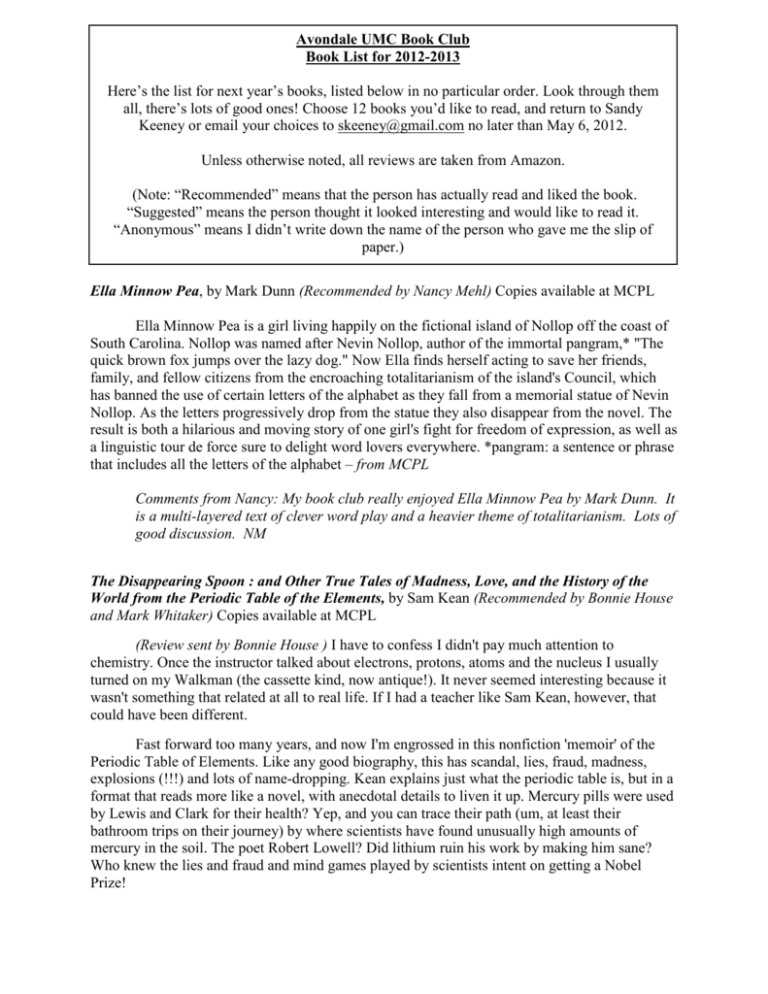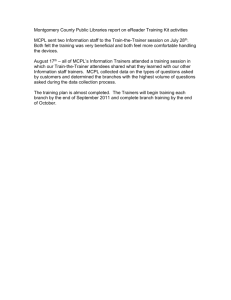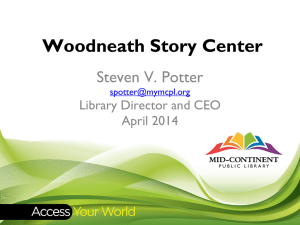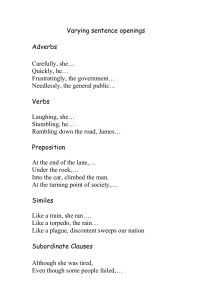Book Club Ballot 2012-2013 - Final
advertisement

Avondale UMC Book Club Book List for 2012-2013 Here’s the list for next year’s books, listed below in no particular order. Look through them all, there’s lots of good ones! Choose 12 books you’d like to read, and return to Sandy Keeney or email your choices to skeeney@gmail.com no later than May 6, 2012. Unless otherwise noted, all reviews are taken from Amazon. (Note: “Recommended” means that the person has actually read and liked the book. “Suggested” means the person thought it looked interesting and would like to read it. “Anonymous” means I didn’t write down the name of the person who gave me the slip of paper.) Ella Minnow Pea, by Mark Dunn (Recommended by Nancy Mehl) Copies available at MCPL Ella Minnow Pea is a girl living happily on the fictional island of Nollop off the coast of South Carolina. Nollop was named after Nevin Nollop, author of the immortal pangram,* "The quick brown fox jumps over the lazy dog." Now Ella finds herself acting to save her friends, family, and fellow citizens from the encroaching totalitarianism of the island's Council, which has banned the use of certain letters of the alphabet as they fall from a memorial statue of Nevin Nollop. As the letters progressively drop from the statue they also disappear from the novel. The result is both a hilarious and moving story of one girl's fight for freedom of expression, as well as a linguistic tour de force sure to delight word lovers everywhere. *pangram: a sentence or phrase that includes all the letters of the alphabet – from MCPL Comments from Nancy: My book club really enjoyed Ella Minnow Pea by Mark Dunn. It is a multi-layered text of clever word play and a heavier theme of totalitarianism. Lots of good discussion. NM The Disappearing Spoon : and Other True Tales of Madness, Love, and the History of the World from the Periodic Table of the Elements, by Sam Kean (Recommended by Bonnie House and Mark Whitaker) Copies available at MCPL (Review sent by Bonnie House ) I have to confess I didn't pay much attention to chemistry. Once the instructor talked about electrons, protons, atoms and the nucleus I usually turned on my Walkman (the cassette kind, now antique!). It never seemed interesting because it wasn't something that related at all to real life. If I had a teacher like Sam Kean, however, that could have been different. Fast forward too many years, and now I'm engrossed in this nonfiction 'memoir' of the Periodic Table of Elements. Like any good biography, this has scandal, lies, fraud, madness, explosions (!!!) and lots of name-dropping. Kean explains just what the periodic table is, but in a format that reads more like a novel, with anecdotal details to liven it up. Mercury pills were used by Lewis and Clark for their health? Yep, and you can trace their path (um, at least their bathroom trips on their journey) by where scientists have found unusually high amounts of mercury in the soil. The poet Robert Lowell? Did lithium ruin his work by making him sane? Who knew the lies and fraud and mind games played by scientists intent on getting a Nobel Prize! There's no getting around it, this is a book that makes you think. It's not simple and it assumes you have a basic knowledge of science. Some areas were over my head, but not for long. Kean is a wonderful teacher with a sassy wise guy voice that livens up any of the deeper areas. Orthodoxy, by G. K. Chesterton (Recommended by Jonathan and Betsy Lightfoot) 1 copy available at MCPL If G.K. Chesterton's Orthodoxy: The Romance of Faith is, as he called it, a "slovenly autobiography," then we need more slobs in the world. This quirky, slender book describes how Chesterton came to view orthodox Catholic Christianity as the way to satisfy his personal emotional needs, in a way that would also allow him to live happily in society. Chesterton argues that people in western society need a life of "practical romance, the combination of something that is strange with something that is secure. We need so to view the world as to combine an idea of wonder and an idea of welcome." Drawing on such figures as Fra Angelico, George Bernard Shaw, and St. Paul to make his points, Chesterton argues that submission to ecclesiastical authority is the way to achieve a good and balanced life. The whole book is written in a style that is as majestic and down-to-earth as C.S. Lewis at his best. The final chapter, called "Authority and the Adventurer," is especially persuasive. It's hard to imagine a reader who will not close the book believing, at least for the moment, that the Church will make you free. Comments from Jonathan Lightfoot: Free electronic copies available via the Gutenburg Project. Lightfoots also have one hard copy available. I’ll just add to the review that this is one of my favorite books, and that Chesterton is a master of metaphors and images that help you know what he is talking about more than just intellectually, you actually see poetically with images that help you Know something as you know a friend or a spouse. Searching for God Knows What, by Donald Miller (Recommended by Mark Whitaker) Available at MCPL New York Times best-selling author Donald Miller explores the origin and meaning of redemption in this fully revised and redesigned bestseller. Hysterically funny, wryly provocative, and disquietingly insightful, Searching for God Knows What invites readers to examine their deep need for redemption, to feel it, know it, and live like it is true in their lives. Miller weaves phenomenal characters and true-to-life spectacles into his acclaimed memoir style to enrich, inspire, entertain, and ultimately challenge readers to see life in a new way. He shows that one of the greatest desires of every person is the desire for redemption, to have brokenness repaired. Instead of the chaotic relationships, self-hatred, wreckless consumerism, and anxiety that overrun a life without redemption, Miller uncovers the beauty and power of the Gospel to fulfill one of our deepest needs. The Geeks Shall Inherit the Earth: Popularity, Quirk Theory, and Why Outsiders Thrive after High School, by Alexandra Robbins (Suggested by Sandy Keeney) Available at MCPL *Now a New York Times bestseller* In a smart, entertaining, reassuring book that reads like fiction, Alexandra Robbins manages to cross Gossip Girl with Freaks and Geeks and explain the fascinating psychology and science behind popularity and outcasthood. She reveals that the things that set students apart in high school are the things that help them stand out later in life. Robbins follows seven real people grappling with the uncertainties of high school social life, including: • • • • • • • The Loner, who has withdrawn from classmates since they persuaded her to unwittingly join her own hate club; The Popular Bitch, a cheerleading captain both seduced by and trapped within her clique's perceived prestige; The Nerd, whose differences cause students to laugh at him and his mother to needle him for not being "normal"; The New Girl, determined to stay positive as classmates harass her for her mannerisms and target her because of her race; The Gamer, an underachiever in danger of not graduating, despite his intellect and his yearning to connect with other students; The Weird Girl, who battles discrimination and gossipy politics in school but leads a joyous life outside of it; The Band Geek, who is alternately branded too serious and too emo, yet annually runs for class president. In the middle of the year, Robbins surprises her subjects with a secret challenge--experiments that force them to change how classmates see them. Robbins intertwines these narratives--often triumphant, occasionally heartbreaking, and always captivating--with essays exploring subjects like the secrets of popularity, being excluded doesn't mean there's anything wrong with you, why outsiders succeed, how schools make the social scene worse--and how to fix it. The Geeks Shall Inherit the Earth is not just essential reading for students, teachers, parents, and anyone who deals with teenagers, but for all of us, because at some point in our lives we've all been on the outside looking in. The Story of Stuff: The Impact of Overconsumption on the Planet, Our Communities, and Our Health-And How We Can Make It Better, by Annie Leonard (Suggested by Sandy Keeney) Available at MCPL The Story of Stuff, now available in paperback, offers an astonishing, galvanizing exploration of the stuff we use every day, revealing how overconsumption threatens the planet and our health, and providing hope that change is within reach. The Story of Stuff was received with widespread enthusiasm in hardcover, by everyone from Stephen Colbert to Tavis Smiley to George Stephanopolous on Good Morning America, as well as far-reaching print and blog coverage. Uncovering and communicating a critically important idea—that there is an intentional system behind our patterns of consumption and disposal—Annie Leonard transforms how we think about our lives and our relationship to the planet. From sneaking into factories and dumps around the world to visiting textile workers in Haiti and children mining coltan for cell phones in the Congo, Leonard, named one of Time magazine’s 100 environmental heroes of 2009, highlights each step of the materials economy and its actual effect on the earth and the people who live near sites like these. With curiosity, compassion, and humor, Leonard shares concrete steps for taking action at the individual and political level that will bring about sustainability, community health, and economic justice. Embraced by teachers, parents, churches, community centers, activists, and everyday readers, The Story of Stuff will be a long-lived classic, keeping company with Silent Spring and An Inconvenient Truth . The Destiny of the Republic: A Tale of Madness, Medicine, and the Murder of a President, by Candice Millard (Suggested by Sandy Keeney) Available at MCPL James A. Garfield was one of the most extraordinary men ever elected president. Born into abject poverty, he rose to become a wunderkind scholar, a Civil War hero, and a renowned and admired reformist congressman. Nominated for president against his will, he engaged in a fierce battle with the corrupt political establishment. But four months after his inauguration, a deranged office seeker tracked Garfield down and shot him in the back. But the shot didn’t kill Garfield. The drama of what happened subsequently is a powerful story of a nation in turmoil. The unhinged assassin’s half-delivered strike shattered the fragile national mood of a country so recently fractured by civil war, and left the wounded president as the object of a bitter behind-the-scenes struggle for power—over his administration, over the nation’s future, and, hauntingly, over his medical care. A team of physicians administered shockingly archaic treatments, to disastrous effect. As his condition worsened, Garfield received help: Alexander Graham Bell, the inventor of the telephone, worked around the clock to invent a new device capable of finding the bullet. Meticulously researched, epic in scope, and pulsating with an intimate human focus and high-velocity narrative drive, The Destiny of the Republic will stand alongside The Devil in the White City and The Professor and the Madman as a classic of narrative history. In the Garden of Beasts, by Erik Larson (Suggested by Anonymous) Available at MCPL Erik Larson has been widely acclaimed as a master of narrative non-fiction, and in his new book, the bestselling author of Devil in the White City turns his hand to a remarkable story set during Hitler’s rise to power. The time is 1933, the place, Berlin, when William E. Dodd becomes America’s first ambassador to Hitler’s Germany in a year that proved to be a turning point in history. A mild-mannered professor from Chicago, Dodd brings along his wife, son, and flamboyant daughter, Martha. At first Martha is entranced by the parties and pomp, and the handsome young men of the Third Reich with their infectious enthusiasm for restoring Germany to a position of world prominence. Enamored of the “New Germany,” she has one affair after another, including with the suprisingly honorable first chief of the Gestapo, Rudolf Diels. But as evidence of Jewish persecution mounts, confirmed by chilling first-person testimony, her father telegraphs his concerns to a largely indifferent State Department back home. Dodd watches with alarm as Jews are attacked, the press is censored, and drafts of frightening new laws begin to circulate. As that first year unfolds and the shadows deepen, the Dodds experience days full of excitement, intrigue, romance--and ultimately, horror, when a climactic spasm of violence and murder reveals Hitler’s true character and ruthless ambition. Suffused with the tense atmosphere of the period, and with unforgettable portraits of the bizarre Göring and the expectedly charming--yet wholly sinister--Goebbels, In the Garden of Beasts lends a stunning, eyewitness perspective on events as they unfold in real time, revealing an era of surprising nuance and complexity. The result is a dazzling, addictively readable work that speaks volumes about why the world did not recognize the grave threat posed by Hitler until Berlin, and Europe, were awash in blood and terror. “Larson is a marvelous writer...superb at creating characters with a few short strokes.”— New York Times Book Review The Forgotten Garden, by Kate Morton (Suggested by Anonymous) Available at MCPL From the #1 internationally bestselling author of The House at Riverton, a novel that takes the reader on an unforgettable journey through generations and across continents as two women try to uncover their family’s secret past A tiny girl is abandoned on a ship headed for Australia in 1913. She arrives completely alone with nothing but a small suitcase containing a few clothes and a single book—a beautiful volume of fairy tales. She is taken in by the dockmaster and his wife and raised as their own. On her twenty-first birthday, they tell her the truth, and with her sense of self shattered and very little to go on, "Nell" sets out to trace her real identity. Her quest leads her to Blackhurst Manor on the Cornish coast and the secrets of the doomed Mountrachet family. But it is not until her granddaughter, Cassandra, takes up the search after Nell’s death that all the pieces of the puzzle are assembled. A spellbinding tale of mystery and self-discovery, The Forgotten Garden will take hold of your imagination and never let go. The Adventures of Huckleberry Finn, by Mark Twain (Suggested by Anonymous) Available at MCPL Wild child Huck has to get away. His violent drunk of a father is back in town again, raising Cain. He won't rest until he has Huck's money. So the enterprising boy fakes his own death and sets out in search of adventure and freedom. Teaming up with Jim, an escaped slave with a price on his head, the two fugitives go on the run, travelling down the wide Mississippi River. But Huck finds himself wrestling with his conscience. Should he save Jim, or turn his friend over to a terrible fate? The River of Doubt: Theodore Roosevelt’s Darkest Journey, by Candice Millard (Suggested by Anonymous) Available at MCPL At once an incredible adventure narrative and a penetrating biographical portrait, The River of Doubt is the true story of Theodore Roosevelt’s harrowing exploration of one of the most dangerous rivers on earth. The River of Doubt—it is a black, uncharted tributary of the Amazon that snakes through one of the most treacherous jungles in the world. Indians armed with poison-tipped arrows haunt its shadows; piranhas glide through its waters; boulder-strewn rapids turn the river into a roiling cauldron. After his humiliating election defeat in 1912, Roosevelt set his sights on the most punishing physical challenge he could find, the first descent of an unmapped, rapids-choked tributary of the Amazon. Together with his son Kermit and Brazil’s most famous explorer, Cândido Mariano da Silva Rondon, Roosevelt accomplished a feat so great that many at the time refused to believe it. In the process, he changed the map of the western hemisphere forever. Along the way, Roosevelt and his men faced an unbelievable series of hardships, losing their canoes and supplies to punishing whitewater rapids, and enduring starvation, Indian attack, disease, drowning, and a murder within their own ranks. Three men died, and Roosevelt was brought to the brink of suicide. The River of Doubt brings alive these extraordinary events in a powerful nonfiction narrative thriller that happens to feature one of the most famous Americans who ever lived. From the soaring beauty of the Amazon rain forest to the darkest night of Theodore Roosevelt’s life, here is Candice Millard’s dazzling debut. The Prophet, by Kahlil Gibran (Suggested by Ruth Lanningham) Available at MCPL In a distant, timeless place, a mysterious prophet walks the sands. At the moment of his departure, he wishes to offer the people gifts but possesses nothing. The people gather round, each asks a question of the heart, and the man's wisdom is his gift. It is Gibran's gift to us, as well, for Gibran's prophet is rivaled in his wisdom only by the founders of the world's great religions. On the most basic topics--marriage, children, friendship, work, pleasure--his words have a power and lucidity that in another era would surely have provoked the description "divinely inspired." Free of dogma, free of power structures and metaphysics, consider these poetic, moving aphorisms a 20th-century supplement to all sacred traditions--as millions of other readers already have. An Amish Christmas: A Novel, by Cynthia Keller (Suggested by Anonymous) Available at MCPL Meg Hobart has everything: a happy marriage to a handsome, successful husband, a beautiful home in Charlotte, North Carolina, and three wonderful children. But it all comes crashing down around her the day she learns that her husband, James, has been living a lie—and has brought the family to financial ruin. Penniless and homeless, the Hobarts pack up what little they still possess and leave behind their golden life for good. But it’s not the material things Meg finds herself mourning. Instead, she misses the certainty that she should remain married to James, who has betrayed her trust so thoughtlessly. Worse, she is suddenly very aware of just how spoiled her children have become. Meg wonders what her family has really sacrificed in their pursuit of the American dream. A frightening twist of fate forces the Hobarts to take refuge with a kind Amish family in Pennsylvania, where they find themselves in a home with no computers, no cell phones, nothing the children consider fashionable or fun. Her uncooperative brood confined to the Amish world of hard work and tradition, their futures entirely uncertain, Meg fears she can never make her family whole again. Celebrating life’s simplest but most essential values, packed with laughter and tears, this is a story of forgiveness and the power of love. You will never forget the special moment in time that is An Amish Christmas. The Hunger Games, by Suzanne Collins (Recommended by Rebecca Bennett) Available at MCPL In the ruins of a place once known as North America lies the nation of Panem, a shining Capitol surrounded by twelve outlying districts. The Capitol is harsh and cruel and keeps the districts in line by forcing them all to send one boy and one girl between the ages of twelve and eighteen to participate in the annual Hunger Games, a fight to the death on live TV. Sixteen-year-old Katniss Everdeen, who lives alone with her mother and younger sister, regards it as a death sentence when she is forced to represent her district in the Games. But Katniss has been close to dead and survival, for her, is second nature. Without really meaning to, she becomes a contender. But if she is to win, she will have to start making choices that weigh survival against humanity and life against love. The Girl in the Blue Beret, by Bobbie Ann Mason (Recommended by Bill Farrar) Available at MCPL Inspired by the wartime experiences of her father-in-law, Bobbie Ann Mason has crafted the haunting and profoundly moving story of an American World War II pilot shot down in Occupied Europe, and his wrenching odyssey of discovery, decades later, as he uncovers the truth about those who helped him escape in 1944. At twenty-three, Marshall Stone was a confident, cocksure U.S. flyboy stationed in England, with several bombing raids in a B-17 under his belt. But when enemy fighters forced his plane to crash-land in a Belgian field during a mission to Germany, Marshall had to rely solely on the kindness of ordinary Belgian and French citizens to help him hide from and evade the Nazis. Decades later, restless and at the end of his career as an airline pilot, Marshall returns to the crash site and finds himself drawn back in time, unable to stop thinking about the people who risked their lives to save Allied pilots like him. Most of all, he is obsessed by the girl in the blue beret, a courageous young woman who protected and guided him in occupied Paris. Framed in spellbinding, luminous prose, Marshall’s search for her gradually unfolds, becoming a voyage of discovery that reveals truths about himself and the people he knew during the war. Deeply beautiful and impossible to put down, The Girl in the Blue Beret is an unforgettable story—intimate, affecting, exquisite—of memories, second chances, and one intrepid girl who risked it all for a stranger. To Kill a Mockingbird, by Harper Lee (Suggested by Nancy Mehl) Available at MCPL "Shoot all the bluejays you want, if you can hit 'em, but remember it's a sin to kill a mockingbird." A lawyer's advice to his children as he defends the real mockingbird of Harper Lee's classic novel—a black man charged with the rape of a white girl. Through the young eyes of Scout and Jem Finch, Harper Lee explores with rich humor and unswerving honesty the irrationality of adult attitudes toward race and class in the Deep South of the 1930s. The conscience of a town steeped in prejudice, violence, and hypocrisy is pricked by the stamina and quiet heroism of one man's struggle for justice—but the weight of history will only tolerate so much. One of the best-loved classics of all time, To Kill a Mockingbird has earned many distinctions since its original publication in 1960. It has won the Pulitzer Prize, been translated into more than forty languages, sold more than forty million copies worldwide, and been made into an enormously popular movie. It was also named the best novel of the twentieth century by librarians across the country. The Good Earth, by Pearl Buck (Suggested by Nancy Mehl) Available at MCPL One of the greatest classics of our time, this is the powerfully moving story of peasant Wang Lung – of the family he founded that would one day become a powerful dynasty; of the gods he implored, sometimes with humility, sometimes with anger; and, above all, of the earth that sustained him, the land that he made to prosper against the ravages of nature and the savage attacks of bandit tribes. Extraordinary Ordinary People, by Condoleezza Rice (Suggested by Nancy Mehl) Available at MCPL Condoleezza Rice has excelled as a diplomat, political scientist, and concert pianist. Her achievements run the gamut from helping to oversee the collapse of communism in Europe and the decline of the Soviet Union, to working to protect the country in the aftermath of 9-11, to becoming only the second woman - and the first black woman ever -- to serve as Secretary of State. As comfortable describing lighthearted family moments as she is recalling the poignancy of her mother’s cancer battle and the heady challenge of going toe-to-toe with Soviet leaders, Rice holds nothing back in this remarkably candid telling. This is the story of Condoleezza Rice that has never been told, not that of an ultra-accomplished world leader, but of a little girl – and a young woman -- trying to find her place in a sometimes hostile world and of two exceptional parents, and an extended family and community, that made all the difference. The Outliers, by Malcolm Gladwell (Suggested by Nancy Mehl) Available at MCPL In this stunning new book, Malcolm Gladwell takes us on an intellectual journey through the world of "outliers"--the best and the brightest, the most famous and the most successful. He asks the question: what makes high-achievers different? His answer is that we pay too much attention to what successful people are like, and too little attention to where they are from: that is, their culture, their family, their generation, and the idiosyncratic experiences of their upbringing. Along the way he explains the secrets of software billionaires, what it takes to be a great soccer player, why Asians are good at math, and what made the Beatles the greatest rock band. Brilliant and entertaining, Outliers is a landmark work that will simultaneously delight and illuminate. Dear Me: A Letter to My Sixteen-Year-Old Self, by Joseph Galliano (Suggested by Mark Whitaker) Unavailable at MCPL These nuggets of wisdom are offered by an Academy Award–nominated actor (James Woods), a popular comedian (Aasif Mandvi), and a world-famous novelist (Jodi Picoult) to their sixteen-year-old selves. No matter how accomplished and confident they seem today, at sixteen, they were like the rest of us—often unsure, frequently confused, and usually in need of a little reassurance. In Dear Me, 75 celebrities, writers, musicians, athletes, and actors have written letters to their younger selves that give words of comfort, warning, humor, and advice. These letters present intimate, moving, and witty insights into some of the world’s most intriguing and admired individuals. By turns funny, surprising, raw, and uplifting, this singular collection captures the universal conditions that are youth, life, and growing up. Honolulu, by Alan Brennert (Suggested by Bill and Velma Farrar) Available at MCPL From the bestselling author of the “dazzling historical saga” (The Washington Post), Moloka’i, comes the irresistible story of a young immigrant bride in a ramshackle town that becomes a great modern city “In Korea in those days, newborn girls were not deemed important enough to be graced with formal names, but were instead given nicknames, which often reflected the parents’ feelings on the birth of a daughter: I knew a girl named Anger, and another called Pity. As for me, my parents named me Regret.” Honolulu is the rich, unforgettable story of a young “picture bride” who journeys to Hawai'i in 1914 in search of a better life. Instead of the affluent young husband and chance at an education that she has been promised, she is quickly married off to a poor, embittered laborer who takes his frustrations out on his new wife. Renaming herself Jin, she makes her own way in this strange land, finding both opportunity and prejudice. With the help of three of her fellow picture brides, Jin prospers along with her adopted city, now growing from a small territorial capital into the great multicultural city it is today. But paradise has its dark side, whether it’s the daily struggle for survival in Honolulu’s tenements, or a crime that will become the most infamous in the islands’ history... With its passionate knowledge of people and places in Hawai'i far off the tourist track, Honolulu is most of all the spellbinding tale of four women in a new world, united by dreams, disappointment, sacrifices, and friendship. How Mrs. Claus Saved Christmas, by Jeff Guinn (Suggested by Jonathan Lightfoot) Available at MCPL In How Mrs. Claus Saved Christmas, Jeff Guinn combines solid historical fact with glorious legend to deliver another heartwarming holiday book for the whole family. It's 1620 and Mrs. Claus's dear husband is off in the New World planting the seeds of what will become a glorious Christmas tradition. Meanwhile, Mrs. Claus has chosen to stay in England, where the first signs of a dangerous threat to Yuletide cheer are in evidence. The Puritans have gained control of Parliament and appear determined to take all the fun out of Christmas. But Mrs. Claus knows that it's time for serious action when, in 1647, a law is passed by Parliament that actually punishes anyone who celebrates Christmas. Using as its springboard the actual events of a day in 1647 when ten thousand peasants marched through the streets of Canterbury demanding their right to celebrate a beloved holiday, How Mrs. Claus Saved Christmas is rich in historical detail, adventure, and plain ol' Christmas fun. The Sense of an Ending, by Julian Barnes (Suggested by Mary Hickernell) Available at MCPL This is a book that reveals itself gradually. You think you know what it's about, only to realize you've been mistaken — just like the narrator. What's curious is that you'd think he would know. After all, it's his life you're reading about. The narrator, Tony Webster, has led an ordinary life. He had a group of friends back in his school days who seemed to mean a lot to him. And he had a serious girlfriend while in university. But he moved on, got married, had a child. Now divorced, he's on good terms with both his wife and daughter. Suddenly, an unexpected inheritance forces him to reinvestigate his life. Along the way he finds that his memory has betrayed him. Or did he simply fail to remember what he wanted to forget? "Did you read this book?" my friend asked. "I can't stop thinking about it." That about sums it up. The Sense of an Ending is the kind of book that when you finish, you want to read again just to sort out what clues you missed the first time around. And it makes you think: If one man can get his life so wrong, can shape his memories to fit his own self-satisfied image of himself, doesn't that open the possibility that we all do the same thing to some degree? Oh, this is a great book to talk about. ---Description provided by Mary Hickernell Caleb’s Crossing, by Geraldine Brooks (Suggested by Mary Hickernell) Available at MCPL In Caleb's Crossing, Geraldine Brooks has created a lovely heroine in Bethia Mayfield, a young girl living on Martha's Vineyard in colonial times. Bethia longs to break free of the restrictions of her strict Puritan community. Smarter than her older brother, who is destined to get the education she wants and deserves, Bethia finds comfort in exploring the wilds of the island with a young Native American named Caleb. It is a secret friendship and remains so, even as the two end up in Cambridge: Caleb to study at Harvard, Bethia as an indentured servant who takes care of the students. When I first heard about this book, I wasn't sure I wanted to read it. I knew it was about the the first Native American to graduate from Harvard. That sounded pretty academic to me, not to mention elitist and politically correct. But it is by Geraldine Brooks, a writer I admire. So I plunged ahead and was quite delighted to get swept up in the kind of story I loved as a kid: a headstrong, rebellious young girl in a wild, untamed place defies all the rules and finds love. Actually, scratch that last part. This is a book for grown-ups written by Geraldine Brooks, who not only respects history, she loves it. So while she sets up a story that's easy to fall into, she doesn't shy away from the realities of those times. And Bethia and Caleb's lives take some unexpected turns. The result is a satisfying but sobering look at the early days of this country. This is a great pick for lovers of historical fiction. ---Description provided by Mary Hickernell State of Wonder, by Ann Patchett (Suggested by Mary Hickernell) Available at MCPL In her latest novel, Ann Patchett, author of the beloved Bel Canto, takes her readers down the Amazon and deep into the rain forest in a book that is part adventure story, part morality tale. Marina Singh, a research scientist at a pharmaceutical company, sets out for the Amazon to investigate the sudden death of her colleague Anders Ekman, who had been working with the eccentric scientist Dr. Annick Swenson. Marina has her own past with Dr. Swenson, who (unknowingly) had a profound effect on Marina's career and life. If intimidated by the brilliant Swenson, Marina is nonetheless determined to uncover the true nature of the doctor's research into female reproduction — and the longer Marina stays, the more she falls under the spell of the rain forest and its people. This book may be on a lot of book club lists already — but with good reason. Dr. Swenson, who has probably been in the rain forest just a little too long, is pushing the ethical boundaries of science with her research. The moral questions that Patchett raises, the revelations about the research that seep out gradually, the relationship between these two women, the choices they make, and the ramifications of those choices are ripe for endless discussion and debate. Combine that with Patchett's vivid and voluptuous descriptions of the mystery, beauty and dangers of the rain forest, and you have a practically perfect book club book. My Stroke of Insight, by Jill Bolte Taylor (Suggested by Sandy Keeney) Available at MCPL On December 10, 1996, Jill Bolte Taylor, a thirty-seven- year-old Harvard-trained brain scientist experienced a massive stroke in the left hemisphere of her brain. As she observed her mind deteriorate to the point that she could not walk, talk, read, write, or recall any of her life-all within four hours-Taylor alternated between the euphoria of the intuitive and kinesthetic right brain, in which she felt a sense of complete well-being and peace, and the logical, sequential left brain, which recognized she was having a stroke and enabled her to seek help before she was completely lost. It would take her eight years to fully recover. For Taylor, her stroke was a blessing and a revelation. It taught her that by "stepping to the right" of our left brains, we can uncover feelings of well-being that are often sidelined by "brain chatter." Reaching wide audiences through her talk at the Technology, Entertainment, Design (TED) conference and her appearance on Oprah's online Soul Series, Taylor provides a valuable recovery guide for those touched by brain injury and an inspiring testimony that inner peace is accessible to anyone.






